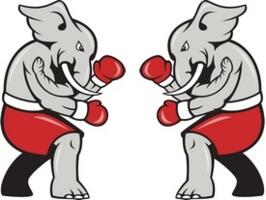Debate Showdown: Bush vs. Trump
A Commentary by Fran Coombs
Jeb Bush showed he means business at tonight’s Republican presidential debate when he peeled open his shirt at a public appearance earlier this week to reveal an old Reagan/Bush ’84 campaign T-shirt.
Tonight’s debate will highlight the first major showdown of the Republican race, with Bush, darling of the GOP establishment, hoping to slow down the insurgent candidacy of Donald Trump, the establishment’s worst nightmare.
Consider the numbers.
Bush, former governor of Florida and son and brother of presidents, entered the race as the odds-on favorite. Fifty-six percent (56%) of Likely Republican Voters told Rasmussen Reports in June when Bush announced his candidacy that he was likely to be the party’s presidential nominee next year. He was nearly 10 points ahead of his closest rival. Now just 41% feel that way, a 15-point drop for Bush over the last three months.
By contrast, only 27% of Republicans thought Trump was likely to end up as their party’s nominee when the outspoken billionaire businessman formally entered the race in mid-June. But 62% now see him as the likely GOP standard-bearer in 2016, a 35-point increase.
(Want a free daily e-mail update? If it's in the news, it's in our polls). Rasmussen Reports updates are also available on Twitter or Facebook.
In the interim, Bush did all the traditional things right. He raised more money than his opponents, hired seasoned policy advisers and campaign staffers, offered specific plans on key issues, showed his independence by challenging the party’s status quo with his moderate views on illegal immigration to court the Hispanic vote and generally played by the rules.
Trump, on the other hand, did everything wrong. Right from the start, he appeared to be winging it on the issues, complaining that America doesn’t “win” anymore and talking in generalities about what he would do to change that. He risked alienating the elusive Hispanic voter that party leaders consider critical to a GOP win by taking a hard line on illegal immigration. He insulted those who disagreed with him and refused to apologize for statements the media stirred up into controversies.
But for a Republican base, sick of the Doles, McCains and Bushes of the past, Trump appears to have the right message at the right time - like Ronald Reagan in 1976 and 1980, another presidential hopeful battered by the GOP establishment at the time but canonized ever since.
This is a Republican base, after all, that wants to repeal Obamacare, confront President Obama and stop his executive order to protect up to five million illegal immigrants from deportation and dramatically cut the size of the federal government.
Republicans voted enthusiastically last November and won control of the full Congress. But since then, nothing has happened. The promised revolution has fizzled to a halt in the face of Obama’s veto threats and the timidness of GOP congressional leaders who don’t want to risk any political capital unless they can guarantee a win.
No wonder, most GOP voters have said in surveys for years that their representatives in Congress have lost touch with the party’s voters throughout the nation. Republicans are even unhappier now with Congress than out-of-power Democrats are.
Tensions between new conservative Republican senators like Ted Cruz and Rand Paul and longtime Senate GOP fixtures like John McCain, Mitch McConnell and Lindsey Graham suggest that the party is on the brink of civil war. The Bush-Trump battle mirrors that division.
As for the Hispanic vote, Republican voters, long obsessed with sealing the borders, consider it important to their presidential chances next year but aren’t overly concerned that a hard line on illegal immigration will hurt them with those voters.
Hillary Clinton, the likely Democratic presidential nominee next year, is anathema to most Republicans. More than 80% of GOP voters regularly disapprove of the president’s job performance, and seven-out-of-10 Republicans think she and Obama agree on most major issues.
It’s no help to Bush then that right now 36% of Republicans think he has more in common with Clinton than with voters in his own party when it comes to the major issues facing the nation. Slightly more GOP voters (40%) disagree, but one-in-four (24%) aren’t sure.
Tonight in the center ring, Bush will be swinging hard to change that perception.
Please sign up for the Rasmussen Reports daily e-mail update (it’s free) or follow us on Twitter or Facebook. Let us keep you up to date with the latest public opinion news.
Fran Coombs is the managing editor of Rasmussen Reports.
See Other Political Commentaries.
See Other Commentaries by Fran Coombs.
Views expressed in this column are those of the author, not those of Rasmussen Reports. Comments about this content should be directed to the author at [email protected]
Rasmussen Reports is a media company specializing in the collection, publication and distribution of public opinion information.
We conduct public opinion polls on a variety of topics to inform our audience on events in the news and other topics of interest. To ensure editorial control and independence, we pay for the polls ourselves and generate revenue through the sale of subscriptions, sponsorships, and advertising. Nightly polling on politics, business and lifestyle topics provides the content to update the Rasmussen Reports web site many times each day. If it's in the news, it's in our polls. Additionally, the data drives a daily update newsletter and various media outlets across the country.
Some information, including the Rasmussen Reports daily Presidential Tracking Poll and commentaries are available for free to the general public. Subscriptions are available for $4.95 a month or 34.95 a year that provide subscribers with exclusive access to more than 20 stories per week on upcoming elections, consumer confidence, and issues that affect us all. For those who are really into the numbers, Platinum Members can review demographic crosstabs and a full history of our data.
To learn more about our methodology, click here.






